Bihar SIR: ECI already aware of responsibility, says Supreme Court

SC to hear pleas challenging Election Commission’s Special Revision of electoral rolls in Bihar, Tamil Nadu and West Bengal; issues notice to ECI
The Supreme Court of India on Thursday continued hearing petitions challenging the Special Intensive Revision (SIR) of electoral rolls in Bihar, where the Election Commission of India (ECI) has undertaken a large-scale verification and deletion exercise ahead of upcoming elections.
During the hearing, the Court underscored that the ECI “knows its responsibility” and is bound to publish the final voter list after completing additions and deletions, while also ensuring that the process remains transparent and within the constitutional framework
A Bench led by Justice Surya Kant, with Justice Joymalya Bagchi, was hearing petitions filed by the Association for Democratic Reforms (ADR) and others represented by Senior Lawyers Prashant Bhushan and Gopal Sankaranarayanan.
The Court first directed that the ECI’s latest reply and affidavit, which according to Senior Advocate Rakesh Dwivedi had been filed earlier in the day, be circulated to all petitioners. The Bench also granted liberty to Bhushan to file a rejoinder after examining the Commission’s submission.
Justice Kant observed that while elections are imminent, the final electoral roll must be shared with political parties and polling agents and that transparency measures must continue after the list is frozen.
He remarked, “They know their responsibility and after doing addition and deletion, they are bound to publish it.” The Bench clarified that the matter would remain open until publication and subsequent rejoinders.
Appearing for the petitioners, Advocate Prashant Bhushan contended that the ECI had failed to publish the “frozen” final voter roll on its website despite major changes to booth numbers and constituency-wise lists. He said fresh deletions were happening even after the draft roll stage and that the timeline had become too compressed for meaningful public verification.
“Today we stand a day from when the list will be finalised. Now time is too short for an inquiry. But for transparency, the frozen voter list must be published,” Bhushan urged.
He further submitted that the Commission’s own affidavits acknowledged recent deletions and additions and that public scrutiny was essential to maintain faith in the electoral process.
Justice Kant noted Bhushan’s concern but clarified that guidelines already exist for similar SIR exercises in other states. “Yes, you have made points in guidelines to be followed for SIR in other states,” he said.
Senior Advocate Gopal Sankaranarayanan, also representing the petitioners, said the issue was not political but constitutional. He argued that the SIR must adhere to the Representation of the People Act, 1951, and that no administrative data collection could override statutory safeguards.
“None of us stand here for any of these parties. This is a completely unconstitutional exercise,” he said. “Representation of the People Act is being thrown overboard, and enumeration data has been substituted. They must respond to our constitutional arguments.”
The Bench took note of the submission reiterating that these points would be considered after ECI’s reply and rejoinder are on record.
Representing the Election Commission, Senior Advocate Rakesh Dwivedi defended the revision process, calling it a lawful and necessary administrative exercise following earlier findings that Bihar’s voter lists exceeded the State’s adult population, a point the Supreme Court itself has previously noted.
Dwivedi said the Commission had filed its affidavit and verified documents, rejecting the claim that the ECI was acting opaquely.
“Till tomorrow is the time. How can you say we will not put out the final roll?” he remarked, adding that false or forged statements were being circulated to mislead the court and that the ECI would “reply factually and transparently.”
He maintained that all additions and deletions had been made through established processes and that the final roll will be made public once the statutory freeze period begins.
The case is now expected to be heard on November 4.
Past Hearings
On the last hearing, on October 9, the Court had directed the Bihar State Legal Services Authority (SLSA) to ensure immediate assistance to all individuals reportedly excluded from Bihar’s final voter rolls during the Election Commission’s “Special Intensive Revision,” ahead of the Assembly elections.
Earlier, the ECI had told the Court that the voter roll revision in Bihar had followed due process and that no genuine voter had complained; only Delhi-based NGOs had raised objections through data analysis Previously, on September 15, the Court had assumed that the ECI, as a constitutional authority, was following the law in conducting the Special Intensive Revision (SIR) of Bihar’s electoral rolls and warned that any illegality would render the exercise void.
Case Title: Association for Democratic Reforms & Ors v. Election Commission of India & Anr.
Hearing Date: October 16, 2025
Bench: Justice Surya Kant and Justice Joymalya Bagchi
